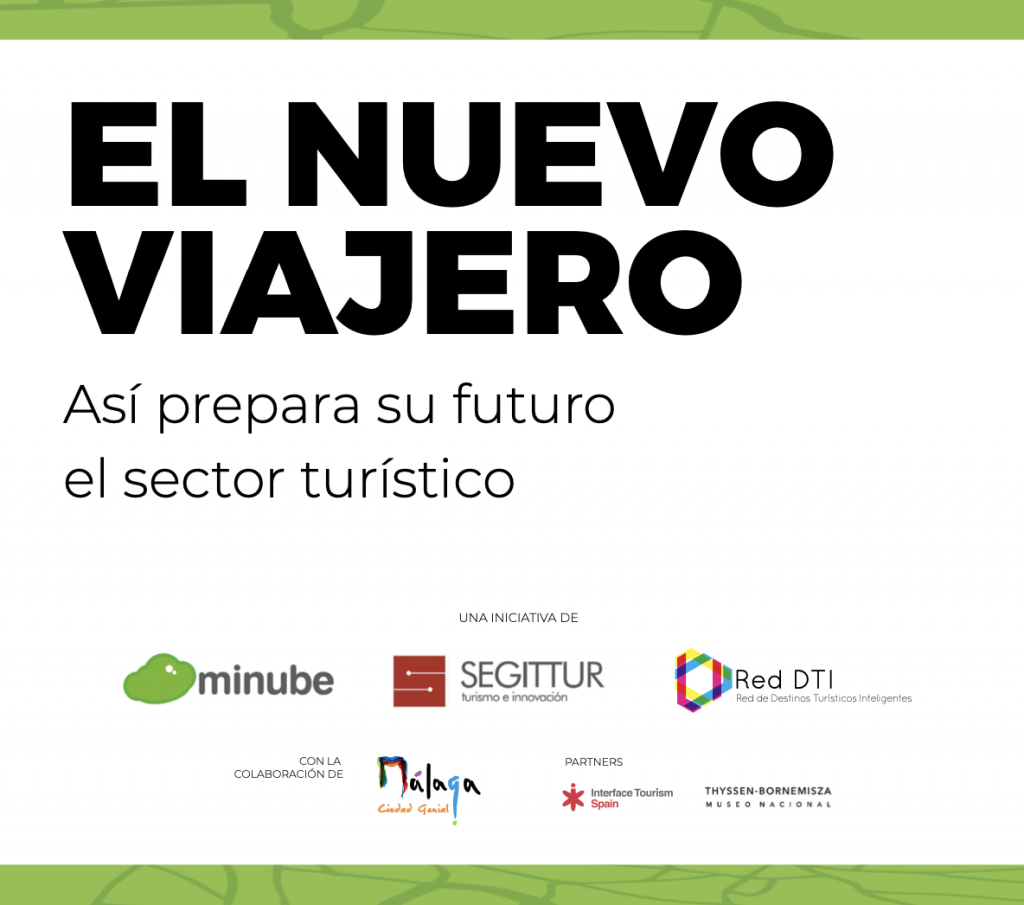On June 29th, the White Paper “El Nuevo Viajero” was presented - the result of collaboration between Segittur, Minube and Red DTI, with the support of Málaga Turismo, among others. Through this initiative it has been tried to give light to the new social habits, consumption, emotional and motivational characteristics of the traveling community, as well as to dealing with the new operating models of tourist destinations, the features that will mark its future in the new post-crisis stage, the key points on which they will be supported to develop strategies for their future development, among others.
In this sense, special emphasis is also placed on the phenomena of sustainability and digitalization. With all this, it is intended to respond to how the tourist destination has to be in these new circumstances, the adaptations that it has to carry out to cover the needs of tourist consumers, in addition to being efficient and sustainable both from an economic and environmental, as well as social and cultural points of view.

Thus, from the point of view of the analysis carried out on the characteristics of travelers in this new stage, as well as the trips they are going to make, it is concluded that among current tourist preferences, national trips continue to prevail, using, if possible their own transport, reducing the number of annual trips they plan to make. All this takes place mainly due to the lack of confidence and the marked uncertainty that continues to dominate the mentality of travelers up to this day, as a result of the health crisis and the numerous and changing restrictions that have taken place over the last year and a half.
However, the study also reveals that, counting with the necessary security to make the trip, the tourist consumer will be willing to book at any time, confirming that the traveling community continues to want to travel and to have tourist experiences, being the only reason that hinders the decision to travel the health and legal uncertainty applicable to the trip.
Said that, the traveler is looking for personalization of the offer, to have an access to virtual and digital content related to the different products, services, and stages of the trip, as well as digital interactions with tourism agents, to obtain unique experiences. Tourism agents, from their part, are playing an essential role in this new stage, being professionals with the ability to provide the necessary advice to the client, personalize the offer, suggest flexibility and inspire confidence. In this sense, both tourism intermediaries and providers, as well as tourist destinations, have to adapt themselves to the new challenges posed by tourist demand and the general environment, taking into account the changes in the traveling mentality that have occurred in the recent years and months. Destinations, therefore, will have to bet more and more on a specialized, personalized and packaged offer, covering in this way the most needs and desires of the demand.
As pointed out by the experts, with whose participation has been counted for the preparation of the White Paper, given all the problems produced throughout the health crisis, and the repercussions it has had on the personal and professional lives of the population, the today's travelers will seek an emotional and mental refuge. This is betting on experiences that facilitate the balance between physical well-being, emotional health and spiritual peace. From this point of view, it should be bet on sustainable tourism and the so-called slow tourism, - a typology contrary to intensive and mass tourism, which gives the possibility of fully enjoying the stay in a destination, with calm, discovering the natural, cultural and heritage spaces of the area.
Destinations, from their part, in addition to adapting to the new ways of doing tourism and the needs of the tourists, will face a great competitive level, so that in this race will win those who know how to provide exceptional conditions for creating a perfect environment for both weekend tourists and those who are going to travel there for a long time, for example, taking advantage of remote working.
Apart from this, exhaustive work has to be carried out, fostering, among others, collaborative relationships with tourism agents on a wide scale, in order to create a powerful, representative, recognizable brand with a highly positive reputation. As according to specialists, the brand and reputation that a destination has, will play an essential role in promoting sales. Likewise, the strategy of converting a destination into a smart destination must be accentuated, leading from sustainability the development of the tourism sector through innovation and technology.
From this point of view, availability and access to data by destination managers will be crucial to know how to personalize each tourist experience, which is what the traveler is currently looking for, as it was mentioned previously. Technology and digital solutions, meanwhile, are the main drivers to reduce uncertainty and to inspire confidence in employees and travelers. However, it must be taken into account that technology itself is not an objective, but a mean to achieve a result and certain improvements. In a global sense, the technology-based solutions that are gaining importance are, among others, biometric technologies, tools that provide security in payments, virtual and augmented reality.
From the point of view of global sustainability, destinations must ensure well-being and social inclusion, without compromising the well-being of future generations. In general terms, destinations and their managers have to be able to determine a tourist identity that is characteristic for that destination, always aligned with the economic and social nature of the area, without losing the original identity.
The complete Book and related information can be consulted through the following link: https://www.minube.com/story/elnuevoviajero

